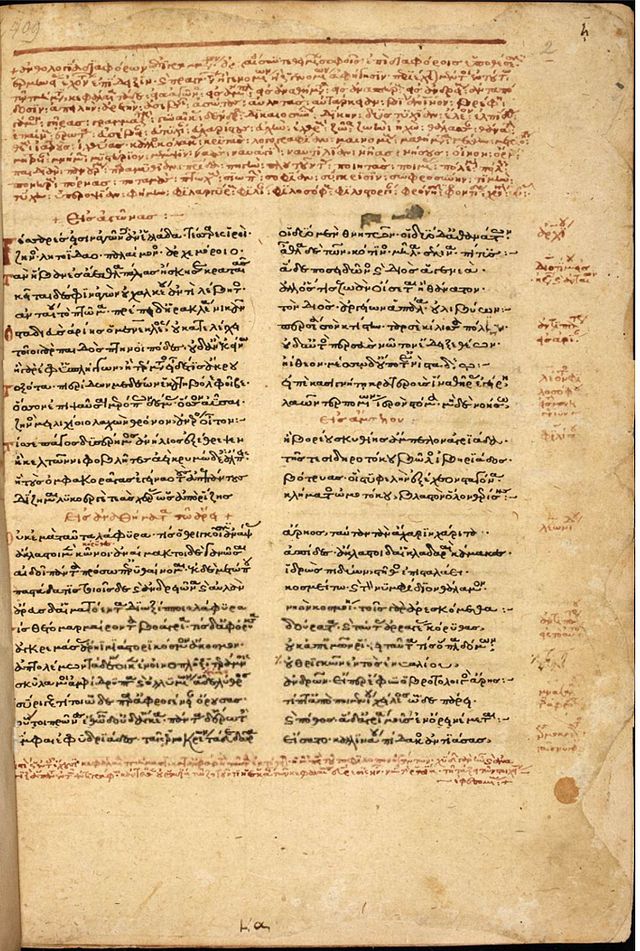Loading AI tools
Anthology of Greek epigrams and poems From Wikipedia, the free encyclopedia
The Anthology of Planudes (also called Planudean Anthology, in Latin Anthologia Planudea or sometimes in Greek Ἀνθολογία διαφόρων ἐπιγραμμάτων ("Anthology of various epigrams"), from the first line of the manuscript), is an anthology of Greek epigrams and poems compiled by Maximus Planudes, a Byzantine grammarian and theologian, based on the Anthology of Cephalas. It comprises 2,400 epigrams.

The Anthology of Planudes starts with the text: «Ἀνθολογία διαφόρων ἐπιγραμμάτων, συντεθειμένων σοφοίς, ἐπί διαφόροις ὑποθέσεσιν ...» (Anthology of various epigrams, created by wise people, about different subjects ...) and consists of seven books.
It can be found in an autograph copy of Planudes in Biblioteca Marciana (codex Marcianus gr. 481) in Venice but also in two apographs, one in an incomplete edition (in London, British Library Add MS 16409) and the other in the final edition of the anthology (which is only in fragmentary form, in Paris, Paris B.N. gr. 2744), as well as in several printed editions.[1]
Several printed copies of the Planudean Anthology were made, as it was the only known anthology of Greek epigrams and poems until 1606, when the Palatine Anthology manuscript was found.
The anthology is today part of the corpus of texts known today as the Greek Anthology. The 397[2][3][4] epigrams not found in the Palatine Anthology (also mentioned as 395[5] and often as 388[6][7][8]) are usually included in the Greek Anthology as the Appendix Planudea.[2][6]
Even though the Anthology of Planudes is based in the Anthology of Cephalas, comparison with the Palatine Anthology (also based on Cephalas's anthology) shows that not only many poems and epigrams were omitted (Palatine has 3700 epigrams, while the Planudean only 2400), but also Planudes made several mistakes or "corrections". At the beginning the transcription was done accurately, but after a certain point omissions become more and more as if the author lost his interest or was pressed to finalise the books. As a result, when the much more accurate Palatine Anthology was discovered, the interest of researchers was shifted from the Planudean to the Palatine. The only important element of the Planudean collection is the 388 epigrams not found in the Palatine, which are considered to have been part of the Anthology of Cephalas, but for an unknown reason were not transcribed in the Palatine Anthology.[2]

The first printed edition of the Anthology of Planudes (editio princeps) was printed by Janus Lascaris in 1494 in Florence under the title «Anthologia Graeca».[9] It was also printed later on by Aldus Manutius (Venice 1503, 1521, 1551), Badius Ascensius (Paris 1531), P. and J.-M. Nicolini (Venice 1550), Jean Brodeau (Basel 1549), Henricus Stephanus (Paris 1566).
The edition of Bosch was printed between 1795 and 1822 in Utrecht in five volumes with a Latin translation by Hugo Grotius entitled «Anthologia Graeca cum versione Latina Hugonis Grotii». Apart from the text of the Planudean Anthology, this edition also included other texts after the first half of the third book.
Seamless Wikipedia browsing. On steroids.
Every time you click a link to Wikipedia, Wiktionary or Wikiquote in your browser's search results, it will show the modern Wikiwand interface.
Wikiwand extension is a five stars, simple, with minimum permission required to keep your browsing private, safe and transparent.